Saudi Arabia’s National Energy Services Company (Tarshid) announced a new energy efficiency project in collaboration with Al Amal Mental Health Hospital (Irada). The project will target 19 buildings within the hospital premises in Al Qurayyat.
The project aims to reduce electricity consumption and improve energy use. Tarshid reported that annual electricity use will drop by 20%, from 4.5 million kilowatt-hours to 3.7 million kilowatt-hours. This reduction is estimated to save over 1,500 barrels of oil equivalent annually and cut carbon emissions by 500 metric tons. The reduction in emissions is comparable to planting more than 9,000 tree seedlings each year.
The initiative includes measures to enhance building systems and equipment. This includes upgrading air conditioning chillers to energy-efficient models and improving the building management system to better control cooling and ventilation systems. Other measures include adding variable frequency drives (VFDs) to optimize system performance and scheduling for air handling units. Lighting will also be upgraded to LED technology, combined with occupancy sensors and motion detectors to improve energy use.
Tarshid conducted on-site surveys and technical studies to identify energy-saving opportunities before launching the project. These upgrades are in line with energy efficiency improvements promoted by international best practices.
This project is part of Saudi Arabia’s broader renewable energy and sustainability efforts. Other projects in the kingdom include the Sakaka Solar Power Plant with a capacity of 300 megawatts (MW), the Dumat Al Jandal Wind Farm with a capacity of 400 MW, and the planned Jeddah Solar PV Plant with 50 MW capacity. These projects contribute to Saudi Vision 2030, which seeks to diversify energy sources and reduce carbon emissions.


